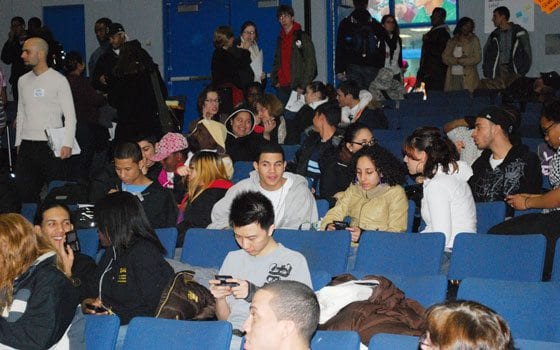

Author: St. John Barned-SmithHigh school students from across Boston gather at English High School in Jamaica Plain on Thursday, March 5, 2009, to ask questions and trade ideas with Boston Public Schools (BPS) Superintendent Dr. Carol R. Johnson and other officials about how the BPS can bridge its $107 million budget gap.
Boston public high school students gathered last Thursday to ask questions and trade ideas with Superintendent Dr. Carol R. Johnson to help find ways to bridge a $107 million budget deficit.
About 250 students, teachers, Boston School Committee members, legislators and community organizers attended the event, held at English High School in Jamaica Plain. Members from the Hyde Square Task Force, Sociedad Latina, the Boston Youth Organizing Project (BYOP), the Center for Teen Empowerment and the Boston Student Advisory Council also attended the meeting.
BYOP Director Najma Nazy’at said that the event offered a chance for youth to be heard, as well as an opportunity to educate fellow students about the extent of the school system’s current budget deficit — and what programs or staff might be on the chopping block.
“They wanted to hear the state of the budget from the superintendent,” Nazy’at said.
In a preliminary Boston Public Schools (BPS) budget presented last month, Johnson proposed cutting 917 staff positions — including 372 teachers — to reduce spending and close the budget gap. The school system has also suggested cuts to programming and transportation, as well as consolidating schools, among other remedies.
At the English High meeting, Boston Student Advisory Council member Ayan Hassan suggested increasing the city’s meals tax, as well as finding ways to tax area colleges and universities, as possible ways to help the BPS make ends meet without wholesale staff cuts.
“It would be hard coming back [to school next year] not seeing my favorite teachers,” Hassan said. “We need to find other ways to fill this gap.”
School committee members said the meeting helped them understand what students want.
“The students make it very clear to us that they are deeply concerned not only about their education, but that they have specific knowledge,” said the Rev. Gregory Groover, school committee chair and pastor of the Historic Charles Street A.M.E. Church in Roxbury. “They know the particular issues that they want us to really spend some more time in going back to the drawing board, and we’re going to do that as the school committee.
“We have to look at ways we can spend more wisely, and not affect the quality of education that we try to provide for our students,” Groover added.
Event organizers asked students to explain to the school committee why they valued going to school and how they thought their schools could save money. Some students said the schools they attended already face steep challenges.
“We already survive on the bare minimum, so we can’t waste anything,” said Boston Latin Academy student Marieljane Bastien. “We have to deal with no paper, our computers don’t work, and in my international relations class, my teacher’s desk is being held up with a can of corn and a French book. So I feel like asking us where our school can save money is ridiculous, because we’re already using all the resources that we already have.”
Students’ cost-cutting ideas ranged from reducing paper use to eliminating school lunches. Others shared concerns about slashed curriculums, which have dropped from seven to four classes a day at some schools, as well as the loss of art programming.
Some in attendance, like Sociedad Latina organizer Melissa Luna, shifted attention to methods that Johnson and the BPS might be able to use to raise funds.
“One of the things students are now talking about is, instead of talking about cuts, talking about how can you start to generate revenue for education, and you started to see that tonight,” Luna said.
“I think one of the big issues that’s going to be coming up is how can we start to create new sources of revenue,” she added. “And that’s exciting to see, because not only is the focus on, ‘Don’t cut my art teacher, don’t cut this in my school,’ but [also on], ‘How are we going to collectively make education better for us at the end of the day?’”
David Martinez, a junior at New Mission High School in Roxbury, said the meeting gave students from different areas a chance to meet.
“Students want to come together and seek change and make a difference — even with the economy being what it is, they want to make a stand,” Martinez said.






